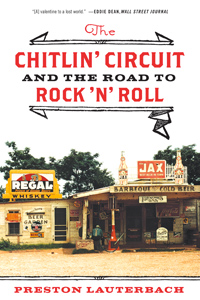Born February 6, 1920, Chicago, Illinois
Died October 1, 2009, Brandon, Florida
Circuit active: 1942-82
This book needed Sax Kari. In 2003, after meeting the glamorous, remarkable, self-proclaimed “King of the Chitlin’ Circuit,” a performer named Bobby Rush, I began telling people that I was writing a book about this chitlin’ circuit. Months piled up, but pages did not. I composed outlines and interviewed artists, but no narrative emerged, due to one rather severe obstacle—I had no idea how the circuit began and therefore, no way to begin the story.
Mercifully, a friend who would gently pose questions that opened doors throughout the life of this project, suggested that I give Sax Kari a call. When I got him on the phone, Sax laughed at the idea of me writing the history of the chitlin’ circuit. He said: “I worked for the man who invented the chitlin’ circuit.” But he welcomed me to come see him in Florida all the same, and in fall 2005, I did.
After spending a morning listening to his stories, it was quite clear that this guy had done it all to make a buck in the entertainment business: payola bagman, stand-up comedy second banana, composer of blaxploitation film soundtrack—for The $6,000 Nigger to be precise—emcee, leader of a big band, record producer, and talent broker, for starters. He’d worked in virtually every city relevant to 20th century American music, Memphis, New Orleans, Chicago, Miami, and New York, and in every genre from swing to hip-hop.
Sax had a sense of humor. He gave me a pile of old pictures of himself, hoping I could use them to help him find work. I asked him to sign one for me. Sitting there in his busted-up trailer—seriously, sun shined through cracks in the walls—he said, with maximum composure and dignity, “My signature is worth over ten thousand dollars.”
Of all Sax’s one-liners—“I’ve made love to chorus girls and movie stars, some of them wouldn’t even tell me their real names”—and tales from the hot spots, his memories of his mentor would provide the biggest breakthrough for my research. For a million years, I could have told people I was writing a book about the chitlin’ circuit and never, ever thought that it could have spun out of Indianapolis, and never known to investigate a printer turned racketeer and nightclub boss there named Denver D. Ferguson as, in Sax’s terms, “the man who invented the chitlin’ circuit.” Now, it would turn out that Denver was an inventor more in the sense that he perfected others’ innovations in the field. But the story of the circuit without Denver Ferguson would not have been complete. And this book, without Sax Kari, would have never hit the shelves.



